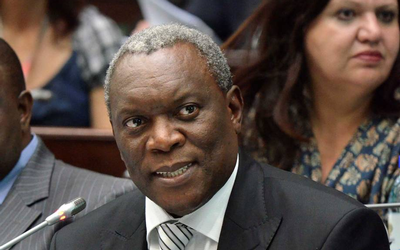THE security cluster of ministers in the Cabinet on Thursday warned the media that the publication of pictures of President Jacob Zuma’s private home in Nkandla was against the law and appealed for this to stop.
The threat is a clear sign that the cluster wants to keep the Nkandla affair out of the headlines. It follows a war of words between the cluster and Public Protector Thuli Madonsela in the past two weeks, where the government approached the courts for an interdict to stop the release of her Nkandla report. The court action was withdrawn.
Briefing media on the Nkandla matter at a post-Cabinet meeting briefing, State Security Minister Siyabonga Cwele said the cluster was "warning" and "reminding" people "that no one is allowed to publish pictures" of the house and its security features.
His colleague in the cluster, Police Minister Nathi Mthethwa, emphasised that it was an offence in terms of the National Key Points Act and said they were appealing for the publication of pictures of Mr Zuma’s home to stop. He said the Nkandla home was declared a national key point in 2010.
But media law expert at Webber Wentzel Dario Milo had a slightly different take. "Section 10 of the National Key Points Act says that if you publish information relating to security measures at a key point, or in relation to an incident that occurred there, you commit an offence.
"That tells us two things. First, it is only a photograph of a security measure or an incident that cannot be published, not a photo of the entire key point.
"An example would be the entrance to the Nkandla bunkers. Second, you must know that you are photographing something relating to a security measure to have committed the offence.
"But the legislation cannot be read as banning any photo at all of Nkandla, or any national key point, as this would be an egregious violation of freedom of expression."
When asked if the withdrawal of their court action meant that this option had been abandoned, Mr Mthethwa said "we have no appetite for running in and out of court", but did not reject the possibility of future court action.
Defence Minister Nosiviwe Mapisa-Nqakula said the court action was not about stopping the report but about getting more time to study it.
Mr Cwele added that it was the security cluster’s constitutional mandate to protect national security and the security of the president. "We will continue to do that (and) we are not going to outsource our function to protect the president," he said.
Acting minister in the Presidency Lindiwe Sisulu, delivering the Cabinet statement, said the engagement between the security cluster and Ms Madonsela was based solely on the security of the head of state. "Cabinet was briefed on the engagement between the justice, crime prevention and security cluster on the public protector’s reports on security measures at President Jacob Zuma’s home in Nkandla.
"Cabinet was briefed that … engagement with the public protector on this matter has been premised on the security of the head of state."
Ms Sisulu said the report of the joint standing committee on intelligence in Parliament had found no evidence of the Department of Public Works paying for the construction of Mr Zuma’s houses.

Siyabonga Cwele. Picture: TREVOR SAMSON
THE security cluster of ministers in the Cabinet on Thursday warned the media that the publication of pictures of President Jacob Zuma’s private home in Nkandla was against the law and appealed for this to stop.
The threat is a clear sign that the cluster wants to keep the Nkandla affair out of the headlines. It follows a war of words between the cluster and Public Protector Thuli Madonsela in the past two weeks, where the government approached the courts for an interdict to stop the release of her Nkandla report. The court action was withdrawn.
Briefing media on the Nkandla matter at a post-Cabinet meeting briefing, State Security Minister Siyabonga Cwele said the cluster was "warning" and "reminding" people "that no one is allowed to publish pictures" of the house and its security features.
His colleague in the cluster, Police Minister Nathi Mthethwa, emphasised that it was an offence in terms of the National Key Points Act and said they were appealing for the publication of pictures of Mr Zuma’s home to stop. He said the Nkandla home was declared a national key point in 2010.
But media law expert at Webber Wentzel Dario Milo had a slightly different take. "Section 10 of the National Key Points Act says that if you publish information relating to security measures at a key point, or in relation to an incident that occurred there, you commit an offence.
"That tells us two things. First, it is only a photograph of a security measure or an incident that cannot be published, not a photo of the entire key point.
"An example would be the entrance to the Nkandla bunkers. Second, you must know that you are photographing something relating to a security measure to have committed the offence.
"But the legislation cannot be read as banning any photo at all of Nkandla, or any national key point, as this would be an egregious violation of freedom of expression."
When asked if the withdrawal of their court action meant that this option had been abandoned, Mr Mthethwa said "we have no appetite for running in and out of court", but did not reject the possibility of future court action.
Defence Minister Nosiviwe Mapisa-Nqakula said the court action was not about stopping the report but about getting more time to study it.
Mr Cwele added that it was the security cluster’s constitutional mandate to protect national security and the security of the president. "We will continue to do that (and) we are not going to outsource our function to protect the president," he said.
Acting minister in the Presidency Lindiwe Sisulu, delivering the Cabinet statement, said the engagement between the security cluster and Ms Madonsela was based solely on the security of the head of state. "Cabinet was briefed on the engagement between the justice, crime prevention and security cluster on the public protector’s reports on security measures at President Jacob Zuma’s home in Nkandla.
"Cabinet was briefed that … engagement with the public protector on this matter has been premised on the security of the head of state."
Ms Sisulu said the report of the joint standing committee on intelligence in Parliament had found no evidence of the Department of Public Works paying for the construction of Mr Zuma’s houses.



























